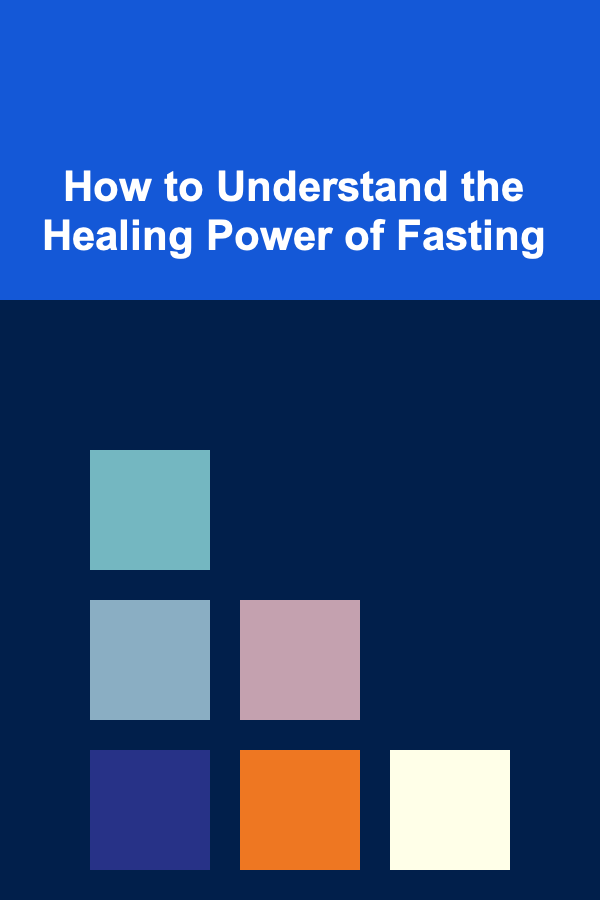
How to Understand the Healing Power of Fasting
ebook include PDF & Audio bundle (Micro Guide)
$12.99$7.99
Limited Time Offer! Order within the next:

Fasting has been a practice for thousands of years, across different cultures, religions, and spiritual traditions. While its historical and cultural roots are diverse, the concept of abstaining from food (and sometimes drink) for a period of time to benefit the body and mind remains a common thread. Over the last few decades, fasting has emerged as a subject of scientific inquiry, and modern research is beginning to shed light on its potential healing powers. This article explores the various aspects of fasting, the mechanisms behind its effects on the body, and its potential therapeutic benefits.
The History and Tradition of Fasting
Fasting is not a modern trend, but a practice that spans millennia. Ancient civilizations, including the Egyptians, Greeks, and Romans, practiced fasting for various reasons, including religious devotion, purification, and health. In many religious traditions, fasting has been used as a tool for spiritual growth and connection to a higher power. For instance, in Islam, fasting during the month of Ramadan is a fundamental practice, while Christians have historically engaged in fasting during Lent.
Similarly, in Eastern traditions, fasting is often seen as a means of attaining spiritual clarity. Hinduism and Buddhism, for example, have long included fasting as a way to cleanse the body and mind, seeking heightened consciousness and awareness.
Beyond religious practices, fasting has also been historically used as a healing method. Ancient Greek physicians, including Hippocrates, the "father of medicine," recommended fasting as a way to allow the body to rest and rejuvenate. Despite its long-standing tradition, fasting's popularity waned in modern times as new medical treatments and technologies became available. However, with the rise of the wellness movement, fasting has reemerged as a popular topic of conversation, particularly in relation to its potential for healing and rejuvenation.
The Science Behind Fasting
Fasting can be defined as the voluntary abstention from food and/or drink for a set period. Depending on the duration and type of fasting, it can be classified into several categories, including intermittent fasting, extended fasting, and periodic fasting.
Fasting impacts the body in various physiological ways, most notably through hormonal changes, cellular repair, and metabolic shifts. The following sections explore these mechanisms in greater detail.
1. Hormonal Changes and Insulin Sensitivity
One of the most well-known effects of fasting is its impact on insulin and blood sugar levels. Insulin is a hormone produced by the pancreas that helps regulate blood sugar by allowing cells to absorb glucose from the bloodstream. When we eat, insulin levels rise to facilitate this process. However, when we fast, insulin levels drop significantly, which is beneficial for several reasons.
Low insulin levels promote fat breakdown (lipolysis), as the body shifts from using glucose as its primary energy source to using fat. This process encourages weight loss and fat reduction, especially around the abdominal area. Moreover, insulin sensitivity improves during fasting, meaning the body becomes more efficient at using insulin when food is consumed, which can help prevent conditions like Type 2 diabetes.
2. Autophagy and Cellular Repair
Autophagy is a process in which the body breaks down and removes dysfunctional or damaged cells. It is a form of cellular cleaning that plays a critical role in maintaining overall health and preventing the buildup of toxins or abnormal proteins in the body. Fasting triggers autophagy, allowing the body to cleanse itself and rejuvenate.
When the body is deprived of food, it enters a state of stress that activates autophagy. During this process, the body essentially "eats" its own damaged cells, breaking them down and recycling their components to create new, healthy cells. This process is believed to have various health benefits, including improved cellular function, reduced inflammation, and even a reduced risk of cancer.
3. Impact on Inflammation
Chronic inflammation has been linked to many modern diseases, including cardiovascular disease, diabetes, and even some cancers. Inflammation is the body's natural response to injury or infection, but when it becomes prolonged, it can lead to tissue damage and the development of disease.
Fasting has been shown to reduce inflammation in the body. Studies have found that fasting decreases levels of pro-inflammatory cytokines, which are proteins that play a key role in the inflammatory process. By reducing inflammation, fasting may help protect the body from a wide range of inflammatory diseases.
4. Brain Health and Neuroprotection
The effects of fasting on brain health are particularly interesting. During periods of fasting, the body produces a protein called brain-derived neurotrophic factor (BDNF), which supports the growth and survival of neurons in the brain. BDNF has been linked to improved cognitive function, better memory, and a reduced risk of neurodegenerative diseases such as Alzheimer's.
Moreover, fasting also activates pathways that protect the brain from oxidative stress and inflammation. The reduction in oxidative damage, combined with improved blood flow to the brain, may enhance mental clarity and contribute to better long-term cognitive health.
Different Types of Fasting
There are various methods of fasting, each offering its own potential healing benefits. The most commonly practiced forms include:
1. Intermittent Fasting (IF)
Intermittent fasting involves cycling between periods of eating and fasting. It is not about restricting calories but about when to eat. Common patterns include the 16/8 method, where individuals fast for 16 hours and eat within an 8-hour window, or the 5:2 method, where individuals eat normally for five days of the week and limit calorie intake to around 500-600 calories on the other two days.
Intermittent fasting has gained immense popularity due to its convenience and effectiveness. It has been shown to promote weight loss, improve insulin sensitivity, and reduce the risk of chronic diseases.
2. Extended Fasting
Extended fasting refers to fasting for a longer period, typically 24-72 hours or more. During extended fasting, the body enters deeper states of metabolic changes, including ketosis, where the body burns fat for energy instead of carbohydrates. Extended fasting can have profound healing effects, especially on cellular repair processes like autophagy.
However, extended fasting should be approached with caution and only under medical supervision, as it can cause nutrient deficiencies or other health risks if done improperly.
3. Periodic Fasting
Periodic fasting involves longer fasting periods that occur on a regular basis, such as once a month or once every few months. These fasting regimens are often used for detoxification, enhancing immune function, and promoting long-term health benefits. Periodic fasting is less intense than extended fasting but still allows the body to undergo deep healing processes.
Potential Therapeutic Benefits of Fasting
While fasting is often associated with weight loss and physical health benefits, it also has numerous therapeutic benefits for specific conditions. Here are some examples of how fasting may promote healing:
1. Weight Loss and Metabolic Health
Fasting is one of the most effective methods for weight loss. By reducing insulin levels and encouraging the body to burn fat for energy, fasting can help individuals achieve and maintain a healthy weight. Moreover, intermittent fasting has been shown to improve metabolism, regulate hunger hormones, and promote fat loss without the need for restrictive diets.
2. Diabetes Management
Fasting has shown promise in managing and even reversing Type 2 diabetes. By improving insulin sensitivity and promoting weight loss, fasting can help regulate blood sugar levels. Some studies suggest that extended periods of fasting may even restore normal blood sugar levels in individuals with Type 2 diabetes, though it is important to approach fasting carefully and under medical supervision in these cases.
3. Cardiovascular Health
Fasting has beneficial effects on heart health. It can help lower blood pressure, reduce cholesterol levels, and improve triglyceride levels. These effects help reduce the risk of heart disease, stroke, and other cardiovascular conditions.
4. Cancer Prevention and Treatment
Emerging research suggests that fasting may play a role in cancer prevention and treatment. Fasting has been shown to slow the growth of cancer cells and improve the efficacy of chemotherapy. It is believed that fasting sensitizes cancer cells to treatment while protecting healthy cells. While fasting should never replace conventional cancer treatments, it may be a useful adjunct to conventional therapies.
5. Immune System Function
Fasting can help rejuvenate the immune system by promoting the regeneration of immune cells. It has been shown that prolonged fasting can reduce the number of old or dysfunctional immune cells and stimulate the production of new, healthy immune cells. This process is particularly beneficial for individuals undergoing chemotherapy or other treatments that may compromise their immune system.
6. Mental Health and Clarity
Fasting has been linked to improvements in mood, mental clarity, and stress resilience. During fasting, the brain produces ketones, which are a more efficient source of fuel than glucose. Ketones may help improve cognitive function, boost mood, and reduce symptoms of anxiety and depression.
Risks and Considerations
While fasting has many potential health benefits, it is not suitable for everyone. Individuals with certain health conditions, such as eating disorders, severe diabetes, or heart conditions, should avoid fasting or do so under the guidance of a healthcare professional. Pregnant women, children, and individuals with compromised immune systems should also approach fasting with caution.
Fasting should be done mindfully and carefully to avoid dehydration, nutrient deficiencies, or other negative side effects. It is important to stay hydrated, eat balanced meals when breaking a fast, and listen to your body's needs during the process.
Conclusion
Fasting is a powerful tool that has the potential to heal the body and mind in a variety of ways. Through its effects on insulin sensitivity, autophagy, inflammation, and cellular repair, fasting offers a wealth of benefits for both physical and mental health. As our understanding of fasting deepens, it is likely that we will continue to discover new ways in which fasting can support healing and longevity.
That said, fasting should always be approached with caution and respect for the body's limits. When practiced mindfully and responsibly, fasting can serve as a transformative tool for health and well-being, unlocking the body's innate ability to heal itself. Whether as a spiritual practice, a tool for weight loss, or a therapeutic strategy for managing chronic diseases, the healing power of fasting is a practice worth considering.

How to Build a Family Science Experiment Day at Home
Read More
How to Protect Your Home from Water Damage in the Winter
Read More
How To Incorporate Vintage Pieces into Modern Outfits
Read More
Choosing the Right Bearing Puller for Hub and Axle Work
Read More
10 Tips for Managing Stress as an Air Traffic Controller
Read More
10 Tips for Detecting and Avoiding Geological Hazards
Read MoreOther Products

How to Build a Family Science Experiment Day at Home
Read More
How to Protect Your Home from Water Damage in the Winter
Read More
How To Incorporate Vintage Pieces into Modern Outfits
Read More
Choosing the Right Bearing Puller for Hub and Axle Work
Read More
10 Tips for Managing Stress as an Air Traffic Controller
Read More